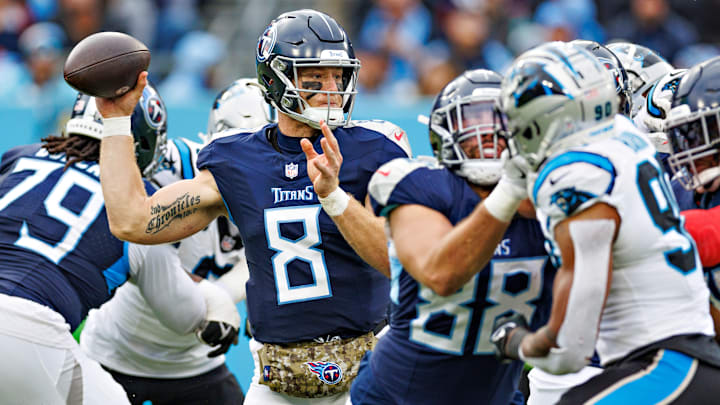Quarterback play is hard to quantify in the NFL, especially when you play for a team like the Tennessee Titans.
Whether the OC is Matt LaFleur, Arthur Smith, Todd Downing, or Tim Kelly, and whether the running back is DeMarco Murray, Dion Lewis, Derrick Henry, or Tyjae Spears, Mike Vrabel's version of the Tennessee Titans is a team that will always treat the running game as "plan A" and the passing game as "plan B."
That is why when Mike Vrabel has been asked about the passing game, he always has one buzzword he brings up. Whether he is talking about receivers, quarterbacks, tight ends, running backs, Jeffery Simmons, or any other skill player who is supposed to be involved in a passing play, Mike Vrabel will always emphasize efficiency.
To be clear, efficiency isn't a bad thing, but it forces fans and media members to explain why the quarterback's numbers don't look like what other quarterbacks around the NFL do. When the plan is to give the quarterback as few passing attempts as possible, it limits what his box score can look like.
The best example of this is the 2020 Tennessee Titans offense. That team averaged more than 30 points per game, had a 2,000-yard running back, and nearly had two 1,000-yard receivers. Despite all of that statistical success, Ryan Tannehill only averaged 239 yards per game because the offense was built around running the ball nearly 50% of the time.
That sort of thing is unheard of in the NFL today, but it is something that the Tennessee Titans aspire to do and it puts a heavy strain on the quarterback being efficient in bad situations.
That's why Tennessee Titans fans shouldn't worry about rookie QB, Will Levis and what his box score looks like.
Looking beyond the Tennessee Titans numbers
All season long the Titans' offensive line has been blocking about as well as Swiss cheese would, but by the time Will Levis got a chance at quarterback the line wasn't just bad, it was bad and banged up.
That means that Will Levis faces pressure more often than almost any other quarterback in the NFL, which is almost impossible to manage for most rookies. Despite that, Levis has performed beyond his years when it comes to evaluating the defense pre-snap and identifying where he wants to go with the ball.
The chart below shows that his confidence and clarity have made him a very accurate passer in those situations, despite his receivers rarely helping him.
Here's how often receivers are charted as open when a QB throws to their first read, along with how efficient every QB is when throwing to their first read. pic.twitter.com/lAoG8b63Ez
— Arjun Menon (@arjunmenon100) November 29, 2023
Levis is right up there with Patrick Mahomes and Justin Herbert when it comes to finding his first read quickly and getting them the ball quickly.
In time and with better protection/better pass catchers, Levis will be able to put up more impressive numbers on the stat sheet despite the limitations of the Tennessee Titans identity. However, charts like this help go beyond the surface-level stats and show things that those stats just don't accurately quantify.
I can guarantee you that I am not someone who would make excuses for Will Levis if he was bad, and you can go back and look at my immediate reaction to the draft pick if you have any doubts about that.
Fans should be excited about how far along Levis is when it comes to his mastery of the offense and his ability to correctly identify the coverage and decide where to go with the ball before the snap. If the Tennessee Titans can get a better supporting cast around him then he is going to be a good player (especially if they can add a blue chip player), and potentially a franchise quarterback.
